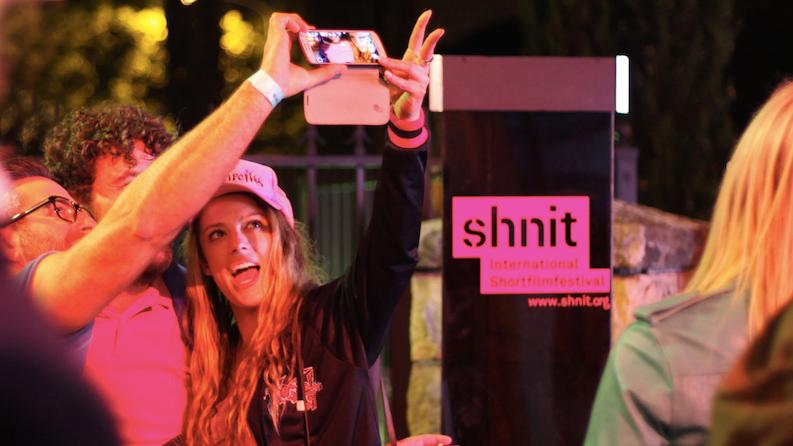The Swiss short film festival that went global

Since "shnit" started in Bern 13 years ago, the festival for little films has grown into something much bigger. Now a respected event that takes place at the same time in eight cities around the world, the challenge is to make the films relevant to diverse audiences across the globe.
“Shall we watch 30 seconds more?” A man in a striped referee’s shirt shouts into a microphone in a packed room on shnit’s opening night in Bern. His question is met with a mixture of boos and cheers. “It’s 50-50. We carry on!” he shouts, pumping his microphone into the air triumphantly. A dancer walks across the screen as the film starts to play again and repetitive music pumps out of the speakers.
It lasts just a few seconds before the boos grow even louder and the film is stopped. This is how it goes on slam movie night, one of the events that aims to mix up the way we watch and interact with films.
“You show a few short films and the audience shouts for them to continue or to stop – so some of the movies don’t make it to the end,” film-maker Olivier Beguin explains to swissinfo.ch between screenings.
Beguin was the 2014 winner of the slam movie night, and this time he’s on the jury. “Last year I had 14 minutes and it went all the way to the end, so that was OK!”
Anina Zimmerli, a 23-year-old student at the University of Fribourg, is called to the front of the room. She’s introduced to the crowd before her short film, Marilyn Monroe, starts to roll. It lasts a minute or so before the booing starts, but after a brief stand-off between the fans and the critics, it manages to play to its full three-minutes.
“I was a bit surprised when people were screaming and stuff, but it was all right because my film is not that professional, so this is more for fun,” Zimmerli said.
‘Playgrounds’
The slam movie night is just one event out of a five-day programme. The festival has a variety of divisions for animation, documentary, topic-specific sections and the main competition, where 60 short films from 20 countries are weighed up by an international jury.
Neto VillalobosExternal link from Costa Rica is one of the jury members, judging films under ten minutes. He says he tries not to look for anything in particular in the films, aside from technical competency, but adds “I don’t like to see a formula”.
“I just expect to feel something…it can be humour or I can be affected in a negative way, but if you don’t feel anything I think you’re missing something”.

More
Bern film festival goes global
One of shnit’s unique selling points is that it happens over the same 12-day period in eight cities, referred to as “playgrounds”. In San José, Costa Rica, shnit began five years ago.
The festival there shows the same films in the main Open competition as in Bern, plus a “Made in Costa Rica” section. Villalobos doesn’t believe that cultural differences will limit the different audiences’ enjoyment of the shorts.
“You can tell a very specific story, but in the end you should be transmitting human feelings … there can be cultural differences but ultimately we are all humans and we all feel happiness or sadness.”
National flavours
In Moscow, shnit is running for the second time. “A revolution is going on around short films,” national juror Anna GudkovaExternal link tells swissinfo.ch. She is one of the judges of the Russian-made films and has noticed a shift in the standard of short film production in recent years.
“The difference is getting smaller – because it was huge. For many years during the Soviet regime we had a more theoretical education [at film schools]. Now it is really changing because you don’t need so much money or equipment to make the film you want.”
She still believes, however, that the plots, themes and range of characters in European films are wider. “I see more ‘real’ people in European films than in Russian ones.”
Each host city has its own national flavour and story, but shnit hopes to prove that you don’t need a huge budget to have international appeal.
The festival runs in eight host cities known as ‘playgrounds’: Bern, Switzerland; Bangkok, Thailand; Buenos Aires, Argentina; Cairo, Egypt; Cape Town, South Africa; Hong Kong; Moscow, Russia and San José, Costa Rica.

In compliance with the JTI standards
More: SWI swissinfo.ch certified by the Journalism Trust Initiative









You can find an overview of ongoing debates with our journalists here . Please join us!
If you want to start a conversation about a topic raised in this article or want to report factual errors, email us at english@swissinfo.ch.